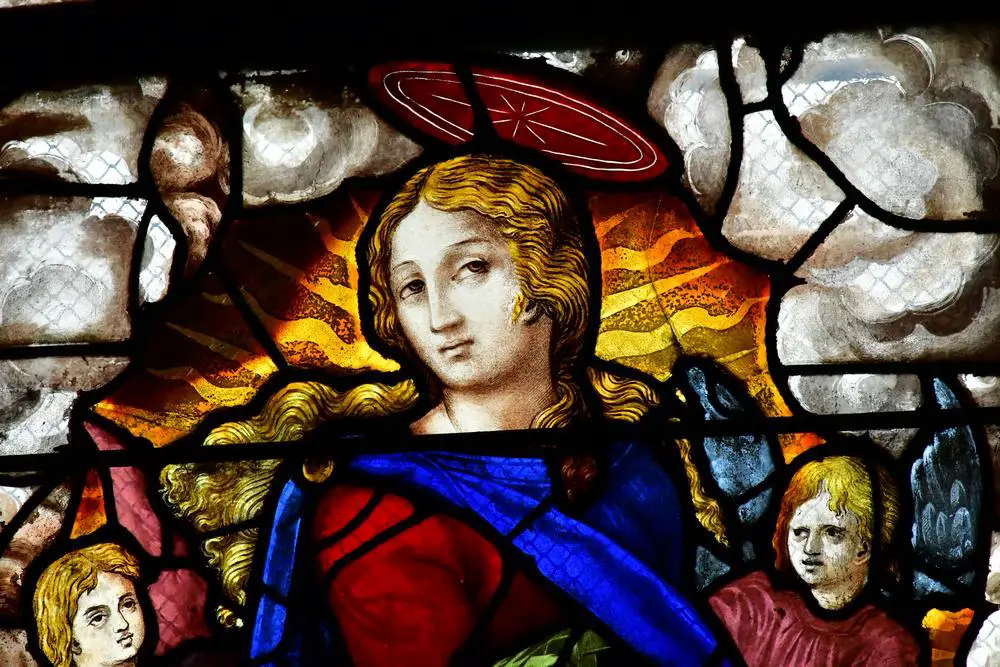As a BetterHelp affiliate, we receive compensation from BetterHelp if you purchase products or services through the links provided
Anxiety is a condition that can often feel isolating, but many find solace in spiritual support. In the realm of spirituality, St. Dymphna stands out as a symbol of hope for those suffering from mental and emotional distress. Her story, emanating from the 7th century, is one of kindness, bravery, and tragic martyrdom. She is revered as the patron saint of anxiety, among other mental health conditions, and her legacy offers comfort to those seeking relief from their internal struggles.
St. Dymphna’s life was marked by noble birth and early exposure to profound suffering, making her a relatable figure for people from all walks of life. Her veneration began in Gheel, Belgium, where she is believed to have been martyred. Over time, this town became a pioneering place for compassionate mental health care, further solidifying her influence. Individuals across the globe turn to her story for inspiration, seek her intercession through prayer, and follow religious practices that honor her memory.
Invoking her name, practicing followers recite prayers and maintain traditions aimed at finding peace and resilience in the face of anxiety. Today, St. Dymphna’s relevance extends beyond historical and religious contexts as her story resonates with contemporary discussions on mental health, providing a unique blend of ancient faith and modern understanding.
Key Takeaways
- St. Dymphna is a historical figure affiliated with relieving anxiety through spirituality.
- Her story of facing adversity is central to her role as a comforter for those with mental distress.
- St. Dymphna’s influence permeates religious practices and remains pertinent in modern mental health discourse.
 Early Life and Martyrdom of St. Dymphna
Early Life and Martyrdom of St. Dymphna
St. Dymphna’s tale begins in 7th-century Ireland, unfolding a life dedicated to purity and faith and culminating in a martyrdom that inspired countless generations.
7th Century Origins
Born in Ireland during the 7th century, St. Dymphna was the daughter of a pagan king and a devout Christian mother. Her mother’s untimely death deeply affected the young girl, whose faith and resolve only strengthened after losing her. Your understanding of her origins lays a foundation for the profound impact of her later life and sainthood.
Life and Virginity Vow
From a young age, Dymphna embraced Christianity, inspired by her mother’s piety. Her commitment to her faith was so profound that she vowed to remain a virgin, dedicating her purity to God. This decision was a defining moment, underscoring her dedication to holiness.
- Vow of Purity: Dymphna promised her life to God, valuing her spiritual integrity above all else.
Martyrdom and Legacy
Dymphna’s father, after the death of her mother, experienced a mental breakdown and, in his disturbed state, developed incestuous desires for his daughter. Dymphna fled to Belgium with her confessor, St. Gerebernus, to escape his advances.
- Escape to Belgium: Alongside St. Gerebernus, Dymphna found refuge but was later discovered by her father.
Faced with his insistent demands upon finding her, Dymphna bravely refused, choosing her vow of purity over her father’s will. In a tragic conclusion, her father, driven by madness, took her life with a sword. The place of her death became a site of pilgrimage for those seeking healing from mental afflictions.
- Ultimate Sacrifice: Her martyrdom is a testament to her unwavering faith and commitment to purity.
Dymphna’s steadfastness in the face of such personal turmoil led to her canonization as the patron saint of those suffering from anxiety and mental illness. Her legacy endures as a beacon of hope and a testament to the power of faith and the sanctity of purity.
Key Takeaway: St. Dymphna’s devotion to her beliefs and tragic end illustrates the courage and strength of unwavering faith, offering solace to those facing their struggles.

Spiritual Significance and Veneration
In the hearts of many, St. Dymphna stands as a beacon of hope, offering comfort to those troubled with mental illness. Through her story, millions find solace and strength, turning to her in need.
Patron Saint of Mental Illness
St. Dymphna, often invoked as the patroness of those afflicted with mental disorders, was just a teenager when she was martyred. Your invocation of her name carries a centuries-old tradition of seeking guidance and healing for mental health. These prayers reflect a common belief: those suffering can find relief through St. Dymphna’s intercession.
Key Takeaway: When you seek support for mental health, remember that St. Dymphna is a symbol of resilience, providing solace through her life’s story.
 St. Dymphna’s Feast Day
St. Dymphna’s Feast Day
Every year on May 15th, you can join countless others in commemorating St. Dymphna’s Feast Day. It’s a day for reflection and recognition of the struggle many face with mental health. Celebrate through prayer, novenas, or attending Mass, embracing St. Dymphna’s enduring spirit of healing and understanding.
Key Takeaway: May 15th is a day to connect with a global community, uniting in faith and collective hope for healing.
Patronage and Influence Globally
St. Dymphna’s influence extends far beyond her story. With shrines dedicated to her in places like Geel, Belgium, known as a haven for the mentally ill, her legacy continues to inspire:
- Prayers and Novenas: People worldwide pray to St. Dymphna for solace in mental suffering.
- Shrines: The United States National Shrine to St. Dymphna in Massillon, Ohio, is a testament to her lasting impact.
- Global Devotion: Known as the “Lily of Éire,” St. Dymphna’s devotion transcends borders, offering a universal symbol of hope against affliction and stigma.
Key Takeaway: St. Dymphna’s role as a patroness crosses continents, helping bridge the gap in understanding mental illness across cultures.
The Legacy of St. Dymphna in Geel
In the town of Geel, Belgium, the influence of St. Dymphna, the patron saint of those suffering from mental afflictions, has shaped a unique legacy of care centered around compassion, community, and progress in mental health.
St. Dymphna’s Influence in Geel
According to tradition, St. Dymphna was a 7th-century Irish princess who fled to Geel to escape her troubled past, bringing solace and healing to those with mental illnesses. Her life story has infused the town with a strong sense of duty toward caring for individuals with mental health challenges. St. Dymphna’s legacy established the roots for a revolutionary family-based care model that still survives.
- Community-based living: Rather than institutionalization, those with mental afflictions live with local families.
- Fostering relationships: Fostering compassionate, supportive relationships between hosts and guests.
- Personalized care: Tailored approaches that honor the individual’s needs above a one-size-fits-all solution.
Key Takeaway: Your understanding of St. Dymphna’s lasting impact on Geel offers insight into how community-based care can thrive, providing personalized support wrapped in dignity and respect.
Pilgrimage and Mental Health Care
Every year, pilgrims flock to Geel, drawn by the compassionate spirit St. Dymphna has instilled. They seek healing and comfort, arriving with hope and searching for the acceptance and support the town has become famous for.
- Sanctuary: The Church of St. Dymphna, crowning the town, serves as a sanctuary and beacon for those searching for healing.
- The hospital: Nearby, a modern psychiatric hospital, continues her healing work, blending specialized healthcare with the town’s ethos.
- Celebrating legacy: Annually, Geel commemorates St. Dymphna, celebrating her legacy of care and the community’s role in mental health.
Key Takeaway: Your journey here can be profoundly moving as you witness a living tradition that seamlessly blends faith, healthcare, and a town’s enduring commitment to empathy and holistic care.

Prayer and Religious Practices
In your journey to finding solace from anxiety and stress, prayers and devotional acts dedicated to St. Dymphna can be a beacon of hope. She understands your afflictions well, being the patron saint of those suffering from mental illness.
Prayers to St. Dymphna
You can start your prayer routine by reciting a prayer to St. Dymphna. This practice invites calmness into your heart and helps you feel connected with her compassionate spirit.
- Morning Prayer: As you wake, ask St. Dymphna to fill your day with peace and serenity.
- Evening Prayer: Before sleep, prayer can be a source of comfort as you entrust your worries to her intercession.
St. Dymphna’s prayer often includes pleas for relief from suffering and petitions for her intercession. Incorporate the ‘Our Father’ and personal intentions, expressing your faith in her understanding as someone who experienced profound mental anguish herself.
Novena and Devotional Acts
Engaging in a Novena to St. Dymphna is a series of prayers you recite for nine days. It’s a way to deepen your devotion and seek her help more earnestly.
- Daily Novena Prayer: You can find specific verses to recite, including petitions for relief from anxiety, depression, and other forms of mental illness.
- Acts of Devotion: Light a candle, visit a church, or set aside a particular time for reflection to honor St. Dymphna and reinforce your commitment to the Christian faith.
While praying, remember St. Dymphna was also a teenager touched by suffering, yet found joy and inspiration in her faith. You can seek to emulate her courage in the face of despair through your devotional acts.
Key Takeaway: Your prayers and devotion honor St. Dymphna’s spirit, creating a personal connection that can bring comfort and hope in life’s stresses.
 Contemporary Relevance and Support
Contemporary Relevance and Support
The need for stepping stones to mental peace is ever more prominent in today’s fast-paced world. Saints like Dymphna offer more than a historical glimpse; they connect reverently with modern mental health struggles.
Mental Health Advocacy
Saint Dymphna has become an emblem of hope for many facing anxiety and mental health challenges. Your connection to her story might come from her life events that mirror the afflictions of modern times, like stress and the loss of a mother. She dedicated her purity and life to others, and now she inspires a movement for compassionate care. Deacon Ed Shoener, a significant voice in the church, emphasizes how the lives of saints like Dymphna encourage advocacy for mental health.
- Families and Treatment: For your family member seeking support, Saint Dymphna’s legacy champions comprehensive care, including:
- Counseling to process complex emotions.
- Medication, if needed, to balance the physiological aspects of mental health disorders.
The legacy of St. Pio of Pietrelcina and Thérèse of Lisieux—both known for addressing scrupulosity and obsessive-compulsive disorders—complements Dymphna’s call for understanding mental struggles with an angle of faith.
 Modern Reflections and Resources
Modern Reflections and Resources
In your search for inner calm amidst uncertainty, modern resources infused with traditional faith may offer solace. Contemporary mental health intersects spirituality, allowing you to explore various support systems:
- Pope Francis: He advocates for the mercy of God in treating mental health, reminding you of the infinite compassion awaiting in faith.
- Reflections: Blogs and personal reflections provide insights into how others cope, offering strategies grounded in the experiences of saints. These can become your toolkit for navigating emotional turmoil.
- A blog might share daily prayers or reflections that resonate with your struggles, helping you start your day focused and calm.
- Prayer cards with Saint Dymphna or reflections from Saint Thérèse can be your companions, offering quick moments of reprieve during stressful times.
Hospitals and centers dedicated to Saint Dymphna present further tangible support, showing that your journey toward healing has many allies.
Key Takeaway: Saints like Dymphna are potent advocates for modern mental health care, underscoring the critical blend of spirituality with practical treatment and resources.
Frequently Asked Questions
In this section, you’ll discover insights about the patron saints who offer hope and intercession for those facing mental health challenges. Whether you’re searching for prayers or seeking to understand their stories, the following questions cover the essentials.
Who is Saint Dymphna and why is she associated with mental health?
Saint Dymphna is revered in Catholic tradition as the patroness of those suffering from nervous and mental afflictions. After her life was marked by tragedy and healing ministries, her legacy became a beacon of comfort for those dealing with emotional disorders.
Key takeaway: Turn to Saint Dymphna’s story for courage and solace in facing your mental health battles.
What are the traditional prayers to recite when seeking comfort for anxiety?
When anxiety strikes, you may find solace in traditional prayers like the Prayer to Saint Dymphna for Anxiety, seeking her intercession for peace of mind and strength. The “Serenity Prayer” is another option many find helpful in seeking calmness and resilience.
Key takeaway: Embracing time-honored prayers can provide peace of mind when anxiety looms large.
Which female saint is known for her intercession in matters of confidence and mental well-being?
Saint Therese of Lisieux, often called The Little Flower, is admired for her simple, trusting approach to God and is a go-to saint for requests involving confidence and mental well-being.
Key takeaway: Lean on Saint Therese’s unwavering trust in God’s grace to uplift your confidence.
How can Saint Dymphna’s story inspire those struggling with emotional distress?
Dymphna’s compassionate response to her trauma inspires many. Her story encourages comfort and advocacy, reminding you that seeking help is a step of bravery and faith.
Key takeaway: Let Saint Dymphna’s journey motivate you to find hope and support in emotional distress.
Are there patron saints to whom one can pray for specific issues like ADHD or sleep troubles?
For issues like ADHD, Saint Thérèse of the Child Jesus is often approached for her childlike simplicity and focus on love. For sleep troubles, Saint Raphael the Archangel is called upon for his role as a healer in biblical scriptures.
Key takeaway: Specific saints offer tailored support for ADHD and sleep disturbances.
What is the Catholic approach to dealing with depression and anxiety through the intercession of saints?
The Catholic approach embraces prayer to patron saints, like Saint Dymphna, as a source of solace alongside seeking professional help. It’s a way to combine spiritual support with practical steps toward healing.
Key takeaway: Blend faith with professional help to address depression and anxiety comprehensively.
- Breaking the Silence: Why Men’s Mental Health Matters More Than Ever - April 15, 2025
- How to Transform a Home’s Patio Space into a Relaxing Space - March 23, 2025
- 5 Strategies to Use a Cell Phone to Help Manage Your Stress - March 23, 2025
This site contains affiliate links to products. We will receive a commission for purchases made through these links.


 Early Life and Martyrdom of St. Dymphna
Early Life and Martyrdom of St. Dymphna St. Dymphna’s Feast Day
St. Dymphna’s Feast Day Contemporary Relevance and Support
Contemporary Relevance and Support Modern Reflections and Resources
Modern Reflections and Resources


